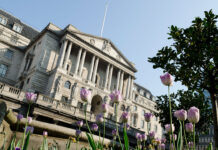A survey by Hargreaves Lansdown found investor confidence in the UK economy has begun to wobble as expectations of interest rates increase dents optimism in the economy.
The HL Investor Confidence Index dropped 2% in as rising inflation outpaces wage increases.
“The number of investors surveyed by HL, who expect interest rate rises in the next six months has fallen back slightly to 78%, compared to 83% in November, possibly reflecting this conundrum, but it’s clear the vast majority of investors are expecting another move by the Bank relatively quickly,” said Susannah Streeter, senior investment and markets analyst, Hargreaves Lansdown.
“At the same time there has been a 2% drop in confidence in UK economic growth among investors, with the combined toxic effects of inflation and an income squeeze playing on minds.”
Weakness in housing shares has been notable as investor offloading companies vulnerable to rising interest rates.
Despite dropping confidence in the UK economy, HL found confidence remain buoyant on UK-lsted assets, which may be due to the large proportion of revenue earned overseas by FTSE 100 firms.
“Even so optimism about UK assets has grown, with investor confidence up 4% compared to November with expectation that the weighting of listed companies towards the mining, energy and financial sectors should start to bear plumper fruit. The only sector to register a drop in confidence was North America, which is likely to be as a result of the jitters continuing about the fate of highly valued tech firms in a higher interest rate environment, which would reduce the value of their future earnings,” Streeter said.
HL’s index data comes as the ONS released data pointing to a 1% drop in wages in November whilst the unemployment rate was 4.1%.
However, the UK jobs market has outperformed dooms day forecasts that predicted the end of the furlough scheme would rock the UK economy and cause mass redundancies. Indeed, the number of jobs in the UK is 400,000 higher than before the pandemic.
“Furlough was seen as the cotton wool that cushioned the UK’s jobs market from the ravages of Covid. The end of the scheme filled many with dread, a fear that those still being protected would find themselves out of work sending unemployment levels soaring,” said Danni Hewson, AJ Bell financial analyst.
“The reality is an intriguing picture with a record level of job vacancies, the number of employees more than 400,000 above that pre-pandemic and the redundancy rate at a record low. So far so good, but that’s not quite the full story and between the lines is a complex situation that does require careful consideration.”





